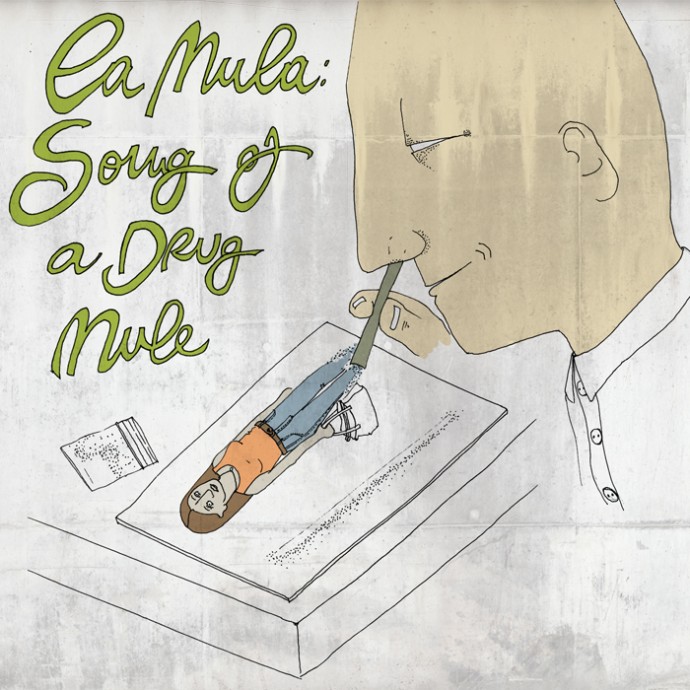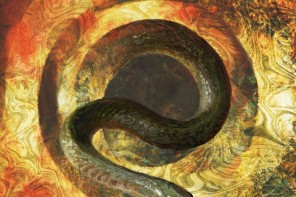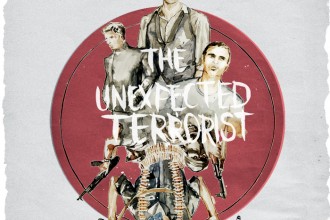Cocaine. White. Potent. Expensive. Cut a line on the plate. Roll the note and snort.
Before it hits, take a moment to think.
You’re snorting someone’s living hell. Mules are used to carry goods. In this case, the mule is human. Spoiled rich brats snort it up and party hard, all white-nosed. Lives are sacrificed, but who cares? It’s good money. Little risk for the consumer, middle man and producer. All the risk falls on the life of the transporter, a.k.a. the mule. From her jail cell in Ecuador, ‘La Mula’ tells Sensa Nostra about her decision to become a drug mule.
I’ve been in in the women’s prison in Quito since 2009. I’m in a cell with four other women. The women here are hardcore, so I keep to myself. Soon after I arrived, I found out that a twenty-one year old Russian girl had just committed suicide in the cell next to mine. In the jail, most inmates are South American, but we have a number of foreign women as well. Some are in for murder or theft, but 80% are drug-related. I came to learn that we are referred to as las mulas, or, as they are known in English, drug mules. Here in jail, we all had similar motives—we did it for our families. Stupid, but honourable.
Out of desperation for money I made the wrong choice. I was in a difficult situation. My husband was in prison, being held by corrupt policemen and represented by corrupt, thieving lawyers. All of our life savings were depleted. The family could not afford to send any more money or to support us. We had to pay the rent. Being a New Zealander in India made it difficult to work legally, as the visa laws were strict, and if they caught me or my daughter working, we would be deported. We had to make money. We began preparing homemade lasagnas and ready-made bottled tomato sauces. They used to sell well in the local markets. Profits were enough to survive on, but not good enough for visits to the prison on the other side of the country, hotels, food, bribes, and legal fees. Costs were high and I had to provide for my family.
So, I was feeling vulnerable, stressed and down and out. I was just so fucking desperate for a break. I wouldn’t exactly say I had the strongest support network. As a former cocaine addict, I was in contact with the wrong sort of people. One of these ‘friends’ saw my desperation and approached me with an easy solution. He proposed that all I’d have to do for him was to carry a bag for him and his wife from Ecuador to India. They promised thousands and everything would be perfect. It was an easy, eight-day job. They booked the tickets and I told everyone that I had landed a fantastic job as an au pair for a rich family. When I arrived in Ecuador, his wife was there with a younger woman and they took me to another town outside of the capital. We stayed in a rented house. It was cold. Everyday, they would work and I was not allowed to leave my room. When the work was done they handed me a bag and sent me on my way. Then it happened.
I was so close to making it through the border at Quito. Even the customs officer said in Spanish to his colleague, “We almost let this one slip.” I pretended not to understand. I could feel my stomach sink into the black abyss of hell. I pretended as if I had no idea what was happening. “What’s the problem, sir?” He smiled an ice-rigid smile and told me to open my bag. To be completely honest, I had no idea what was in the bag–well, apart from the fact that there was a kilo of cocaine hidden in it somewhere. So, I opened the shitty little padlock and they took over.
There I stood in cold sweat, and there they were diving into my bag like vultures ready to rip out my guts. Well, they ripped out my guts, all right. They broke apart the oversized button on the jacket, revealing cocaine packed inside. The customs officer said, “Senora, come with us.” The next weeks were terrible. The call to my daughter was particularly not a cheery moment at all. It was nice to hear her voice. I told her she better sit down. I said, “They got me, I’m in jail, and I won’t be coming home this time.”
It was months after I got caught that the Ecuadorian justice system announced my sentence. Eight years I got. As my heavy head sunk into my chest, my life vanished before my eyes. Memories of family and friends began to flood my mind. Salty tears streamed down my face. As the time passed, I tried over and over again to get my sentenced lowered. No luck. So, I stay as good as possible to get out on good behaviour.
Being in jail is like being in limbo. You are the walking dead. You are alive but you are not living. It is lost time. I sit here amongst noisy, angry, vicious women, dreaming of better days. When I first got here, I was so depressed—I guess anyone would be. It’s a hard mental battle. Every day I stay strong because I want to see my family. Here, to pass the time, I keep myself busy. I study Spanish and conduct yoga classes. I attend a church meeting every Thursday. In this jail you have to work to earn money to buy food. For two years I washed another woman’s clothes to earn money to buy fresh veggies and tobacco. Every now and then I get money from my family abroad. An eighty-four year old New Zealander lady from a church group visits me occasionally. She brings me food and books to read. It’s nice. It helps keep me positive.
This incident has changed my perspective on life completely. I learned, the hard way, to be more appreciative of freedom. Freedom is the most important thing in life. I do regret being a mula. I’d rather have faced the hardships of being poor than had my freedom taken from me. I think of my younger years, my life and the choices I made. And no, my life wasn’t normal. I chose to live an alternative life surrounded by loving friends and a tight community of freaks—other like-minded people.
I’ve had several businesses through the years, from a vegetarian restaurant to selling antiques. Since the recession, people don’t tend to be interested in spending money on antiques and so we lost a lot of money. As one plan failed after the other, I had to find another way to make a living. I decided to start selling dope. I saw it as a stoner helping other stoners out. Dope helped us pay our child’s school fees and save so that she could go to university some day. It went well, but karma kicked me in the ass the day I touched cocaine. Having a child in the midst of this risky lifestyle was not easy. I was always worried about how devastating it would be for my kid if I got caught. I knew the risk I was taking. I do regret it, but thankfully she was already an adult when I went to jail. Desperation forced me to become a mula. I kept on thinking, “Just this one last time.”
I worked hard all my life. I was five years old when I had my first job. As I grew older I began to tire of the type of life my family and friends expected me to live. I did not want to be trapped in a shitty nine-to-five job, just living to pay the bills. I chose to reject working-class slavery because I believe it is unjust. The drugs didn’t ruin my life, the choices I made did. However, living an alternative life does not necessarily mean dealing or taking drugs. Alternative living is when someone lives their life how they want to, instead of depending on the system. Many people in the world dream of living the life they want but are afraid to step outside of the circle society has drawn for them. So to me, alternative living is stepping outside the circle. It is confronting your insecurities and choosing the life you want to live. What happened to me has made me want to change, to stop complaining about bullshit that doesn’t matter, to be more positive and have an overall better attitude towards life. Then, surely things will fall into place. As for now, I just got to get out of this hellhole.







